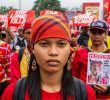The community’s fear of the military is not without history. In 2002, a paramilitary group called Alamara, which the community alleged as military-backed and whose members wear camouflage uniforms like ordinary soldiers, have threatened to kill and rape women including Bigkay.
By JOHN RIZLE L. SALIGUMBA
Davao Today
DAVAO CITY, Philippines — Bai Bibyaon Ligkayan Bigkay, 71, the only known woman datu (tribal chief) of the Lumad Ata-Manobo, filed a complaint against elements of the Philippine Army’s 60th Infantry Battalion before the Commission on Human Rights (CHR) Regional office Tuesday for allegedly encamping in a civilian populated area.
“They (military) have already caused so much fear and distress among the people in my community,” Bigkay said, adding that the troops started encamping in Sitio (sub-village) Natulinan, Palma Gil village, Talaingod town, Davao del Norte since October 22.
“Some children have stopped going to school and some villagers even evacuated,” she said.
Bigkay also reported that one Toto Barintos, a villager who has a retail store at his house, complained of military troops staying at his premises. The situation has forced him and his family to stay somewhere else.
Sitio Natulinan is part of the territory claimed by the Ata-Manobos under the leadership of Datu Guibang Apoga who’s been in the authorities’ wanted list since 1997.
Apoga and several tribesmen resisted the logging operations of the Alcantara company by waging a “pangayaw” (armed resistance for defense). Using their spears and arrows, Apoga killed several company guards in the process, sending a warning message to the company.
Bigkay has allegedly been included in the military’s “order of battle.”
The community’s fear of the military is not without history. In 2002, a paramilitary group called Alamara, which the community alleged as military-backed and whose members wear camouflage uniforms like ordinary soldiers, have threatened to kill and rape women including Bigkay.
“Women run if they see military men. When they go to the field, they always carry their infants in their amet (cloth) so it will be easier for them to just run-away,” Bigkay said.
Villagers live by planting root crops, corn, dawa (native rice) and other products but planting has come to a standstill because of the militarization, said Lucio Igpat, 56, a villager who accompanied Bigkay.
Bigkay observed that the soldiers have been guarding the machineries being used to construct the Talaingod-Bukidnon highway. However, she said that such task should be coordinated and delegated to datus, as is their custom.
“If their task is such, then they should go wherever the machineries are located and not encamp where the civilians are,” said Bigkay.
In a text message, Lt. Col. Llewelyn Binasyo, commanding officer of the 60th IB assigned to the Talaingod area, said they haven’t received a copy of the complaint from the CHR.
“Suffice it to say that other stakeholders in Talaingod are upbeat with the presence of the soldiers of the 60IB,” he added.
Also in a text message, CHR legal officer lawyer Panfilo Junior Lovitos said that a complaint such as the one filed by Bigkay is CHR’s basis to conduct a fact-finding investigation so that they can verify the allegations and obtain additional information or evidence in the field.
“We may require the AFP to submit an affidavit or comment on the complaint,” Lovitos said.
He also said that an investigation report will be made and submitted for resolution and for appropriate recommendation. “The said fact-finding mission presupposes that the encampment was established in a populated area thereby compromising the security of the residents, more particularly children,” Lovitos concluded. (John Rizle L. Saligumba/davaotoday.com)










